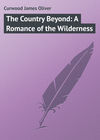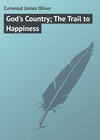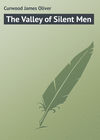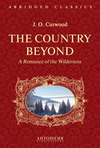Kitabı oku: «The Country Beyond: A Romance of the Wilderness», sayfa 10
Peter sensed sharply the change in his master without knowing the reason for it. Just as the world had changed for Jolly Roger, so Jolly Roger had changed for Peter.
They landed on a beach of sand, soft as a velvet carpet. Peter jumped out. A long-legged sandpiper and her mate ran down the shore ahead of him. He perked up his angular ears, and then his nose caught a fresh scent under his feet where a porcupine had left his trail. And he heard more clearly the raucous tumult of the jay and the musical chattering of the red squirrels.
All these things were satisfactory to Peter. They were life, and life thrilled him, just as it had thrilled his master a few days ago. He adventured a little distance up to the edge of the green willows and the young birch and the crimson masses of fire flowers that fringed the beginning of the forest. It had rained recently here, and the scents were fresh and sweet.
He found a wild currant bush, glistening with its luscious black berries, and began nibbling at them. A gopher, coming to his supper bush, gave a little squeak of annoyance, and Peter saw the bright eyes of the midget glaring at him from under a big fern leaf. Peter wagged his tail, for the savagery of his existence was qualified by that mellowing sense of humor which had always been a part of his master. He yipped softly, in a companionable sort of way.
And then there smote upon his ears a sound which hardened every muscle in his body.
"Throw up your hands, McKay!"
He turned his head. Close to him stood a man. In an instant he had recognized him. It was the man whose scent he had first discovered down at Cragg's Ridge, the man from whom his master was always running away, the man whose voice he had heard again at Yellow Bird's Camp a few nights ago – Corporal Terence Cassidy, of the Royal Northwest Mounted Police.
Twenty paces away stood McKay. His dunnage was on his back, his paddle in his hand. And Cassidy, smiling grimly, a dangerous humor in his eyes, was leveling an automatic at his breast. It was, in that instant, a tableau which no man could ever forget. Cassidy was bareheaded, and the sun burned hotly in his red hair. And his face was red, and in the pale blue of his Irish eyes was a fierce joy of achievement. At last, after months and years, the thrilling game of One against One was at an end. Cassidy had made the last move, and he was winner.
For half a minute after the command to throw up his hands McKay did not move. And Cassidy did not repeat the command, for he sensed the shock that had fallen upon his adversary, and was charitable enough to give him time. And then, with something like a deep sigh from between his lips, Jolly Roger's body sagged. The dunnage dropped from his shoulder to the sand. The paddle slipped from his hand. Slowly he raised his arms above his head, and Cassidy laughed softly.
A few days ago McKay would have grinned back, coolly, good humoredly, appreciative of the other's craftsmanship even in the hour of his defeat. But today there was another soul within him.
His eyes no longer saw the old Cassidy, brave and loyal to his duty, a chivalrous enemy, the man he had yearned to love as brother loves brother, even in the hours of sharpest pursuit. In Cassidy he saw now the hangman himself. The whole world had turned against him, and in this hour of his greatest despair and hopelessness a bitter fate had turned up Cassidy to deal him the finishing blow.
A swift rage burned in him, even as he raised his hands. It swept through his brain in a blinding inundation. He did not think of the law, or of death, or of freedom. It was the unfairness of the thing that filled his soul with the blackness of one last terrible desire for vengeance. Cassidy's gun, leveled at his breast, meant nothing. A thousand guns leveled at his breast would have meant nothing. A choking sound came from his lips, and like a shot his right hand went to his revolver holster.
In that last second or two Cassidy had foreseen the impending thing, and with the movement of the other's hand he cried out:
"Stop! For God's sake stop – or I shall fire!"
Even into the soul of Peter there came in that moment the electrical thrill of something terrific about to happen, of impending death, of tragedy close at hand. Once, a long time ago, Peter had felt another moment such as this – when he had buried his fangs in Jed Hawkins' leg to save Nada.
In that fraction of a second which carried Peter through space, Corporal Cassidy's finger was pressing the trigger of his automatic, for McKay's gun was half out of its holster. He was aiming at the other's shoulder, somewhere not to kill.
The shock of Peter's assault came simultaneously with the explosion of his gun, and McKay heard the hissing spit of the bullet past his ear. His arm darted out. And as Peter buried his teeth deeper into Cassidy's leg, he heard a second shot, and knew that it came from his master. There was no third. Cassidy drooped, and something like a little laugh came from him – only it was not a laugh. His body sagged, and then crumpled down, so that the weight of him fell upon Peter.
For many seconds after that Jolly Roger stood with his gun in his hand, not a muscle of his body moving, and with something like stupor in his staring eyes. Peter struggled out from under Cassidy, and looked inquisitively from his master to the man who lay sprawled out like a great spider upon the sand. It was then that life seemed to come back into Jolly Roger's body. His gun fell, as if it was the last thing in the world to count for anything now, and with a choking cry he ran to Cassidy and dropped upon his knees beside him.
"Cassidy – Cassidy – " he cried. "Good God, I didn't mean to do it! Cassidy, old pal – "
The agony in his voice stilled the growl in Peter's throat. McKay saw nothing for a space, as he raised Cassidy's head and shoulders, and brushed back the mop of red hair. Everything was a blur before his eyes. He had killed Cassidy. He knew it. He had shot to kill, and not once in a hundred times did he miss his mark. At last he was what the law wanted him to be – a murderer. And his victim was Cassidy – the man who had played him fairly and squarely from beginning to end, the man who had never taken a mean advantage of him, and who had died there in the white sand because he had not shot to kill. With sobbing breath he cried out his grief, and then, looking down, he saw the miracle in Cassidy's face. The Irishman's eyes were wide open, and there was pain, and also a grin, about his mouth.
"I'm glad you're sorry," he said. "I'd hate to have a bad opinion of you, McKay. But – you're a rotten shot!"
His body sagged heavily, and the grin slowly left his lips, and a moan came from between them. He struggled and spoke.
"It may be – you'll want help, McKay. If you do – there's a cabin half a mile up the creek. Saw the smoke – heard axe – I don't blame you. You're a good sport – pretty quick – but – rotten shot! Oh, Lord – such – rotten – shot – "
And he tried vainly to grin up into Jolly Roger's face as he became a lifeless weight in the other's arms.
Jolly Roger was sobbing. He was sobbing, in a strange, hard man-fashion, as he tore open Cassidy's shirt and saw the red wound that went clean through Cassidy's right breast just under the shoulder. And Peter still heard that strange sound coming from his lips, a moaning as if for breath, as his master ran and brought up water, and worked over the fallen man. And then he got under Cassidy, and rose up with him on his shoulders, and staggered off with him toward the creek. There he found a path, a narrow foot trail, and not once did he stop with his burden until he came into a little clearing, out of which Cassidy had seen the smoke rising. In this clearing was a cabin, and from the cabin came an old man to meet him – an old man and a girl.
At first something shot up into Peter's throat, for he thought it was Nada who came behind the grizzled and white-headed man. There was the same lithe slimness in her body, the same brown glint in her hair, and the same – but he saw then that it was not Nada. She was older. She was a bit taller. And her face was white when she saw the bleeding burden on Jolly Roger's back.
"I shot him," panted McKay. "God knows I didn't mean to! I'm afraid – "
He did not finish giving voice to the fear that Cassidy was dead – or dying, and for a moment he saw only the big staring eyes of the girl as the gray-bearded man helped him with his burden. Not until the Irishman was on a cot in the cabin did he discover how childishly weak he had become and what a terrific struggle he had made with the weight on his shoulders. He sank into a chair, while the old trapper worked over Cassidy.
He heard the girl call him grandfather. She was no longer frightened, and she moved like a swift bird about the cabin, getting water and bandages and pillows, and the sight of fresh blood and of Cassidy's dead-white face brought a glow of tenderness into her eyes. McKay, sitting dumbly, saw that her hands were doing twice the work his own could have accomplished, and not until he heard a low moan from the wounded man did he come to her side.
"The bullet went through clean as a whistle," the old man said. "Lucky you don't use soft nosed bullets, friend."
A deep sigh came from Cassidy's lips. His eyelids fluttered, and then slowly his eyes opened. The girl was bending over him, and Cassidy saw only her face, and the brown sheen of her hair.
"He'll live?" Jolly Roger said tremulously.
The older man remained mute. It was Cassidy, turning his head a little, who answered weakly.
"Don't worry, McKay. I'll – live."
Jolly Roger bent over the cot, between Cassidy and the girl. Gently he took one of the wounded man's hands in both his own.
"I'm sorry, old man," he whispered. "You won, fair and square. And I won't go far away. I'll be waiting for you when you get on your feet. I promise that. I'll wait."
A wan smile came over Cassidy's lips, and then he moaned again, and his eyes closed. The girl thrust Jolly Roger back.
"No – you better not go far, an' you better wait," she said, and there was an unspoken thing in the dark glow of her eyes that made him think of Nada on that day when she told him how Jed Hawkins had struck her in the cabin at Cragg's Ridge.
That night Jolly Roger made his camp close to the mouth of the Limping Moose. And for three days thereafter his trail led only between this camp and the cabin of old Robert Baron and his granddaughter, Giselle. All this time Cassidy was telling things in a fever. He talked a great deal about Jolly Roger. And the girl, nursing him night and day, with scarcely a wink of sleep between, came to believe they had been great comrades, and had been inseparable for a long time. Even then she would not let McKay take her place at Cassidy's side. The third day she started him off for a post sixty miles away to get a fresh supply of bandages and medicines.
It was evening, three days later, when Jolly Roger and Peter returned. The windows of the cabin were brightly lighted, and McKay came up to one of these windows and looked in. Cassidy was bolstered up in his cot. He was very much alive, and on the floor at his side, sitting on a bear rug, was the girl. A lump rose in Jolly Roger's throat. Quietly he placed the bundle which he had brought from the post close up against the door, and knocked. When Giselle opened it he had disappeared into darkness, with Peter at his heels.
The next morning he found old Robert and said to him:
"I'm restless, and I'm going to move a little. I'll be back in two weeks. Tell Cassidy that, will you?"
Ten minutes later he was paddling up the shore of Wollaston, and for a week thereafter he haunted the creeks and inlets, always on the move. Peter saw him growing thinner each day. There was less and less of cheer in his voice, seldom a smile on his lips, and never did his laugh ring out as of old. Peter tried to understand, and Jolly Roger talked to him, but not in the old happy way.
"We might have finished him, an' got rid of him for good," he said to Peter one chilly night beside their campfire. "But we couldn't, just like we couldn't have brought Nada up here with us. And we're going back. I'm going to keep that promise. We're going back, Peter, if we hang for it!"
And Jolly Roger's jaw would set grimly as he measured the time between.
The tenth day came and he set out for the mouth of the Canoe River. On the afternoon of the twelfth he paddled slowly into Limping Moose Creek. Without any reason he looked at his watch when he started for old Robert's cabin. It was four o'clock. He was two days ahead of his promise, and there was a bit of satisfaction in that. There was an odd thumping at his heart. He had faith in Cassidy, a belief that the Irishman would call their affair a draw, and tell him to take another chance in the big open. He was the sort of man to live up to the letter of a wager, when it was honestly made. But, if he didn't —
Jolly Roger paused long enough to take the cartridges from his gun. There would be no more shooting' – on his part.
The mellow autumn sun was flooding the open door of the cabin when he came up. He heard laughter. It was Giselle. She was talking, too. And then he heard a man's voice – and from far off to his right came the chopping of an axe. Old Robert was at work. Giselle and Cassidy were at home.
He stepped up to the door, coughing to give notice of his approach. And then, suddenly, he stopped, staring thunderstruck at what was happening within.
Terence Cassidy was sitting in a big chair. The girl was behind him. Her white arms were around his neck, her face was bent down, her lips were kissing him.
In an instant Cassidy's eyes had caught him.
"Come in," he cried, so suddenly and so loudly that it startled the girl. "McKay, come in!"
Jolly Roger entered, and the girl stood up straight behind Cassidy's chair, her cheeks aflame and her eyes filled with the glow of the sunset. And Terence Cassidy was grinning in that old triumphant way as he leaned forward in his chair, gripping the arms of it with both hands.
"McKay, you've lost," he cried. "I'm the winner!"
In the same moment he took the girl's hand and drew her from behind his chair.
"Giselle, do as you said you were going to do. Prove to him that I've won."
Slowly she came to Jolly Roger. Her cheeks were like the red of the sunset. Her eyes were flaming. Her lips were parted. And dumbly he waited, and wondered, until she stood close to him. Then, swiftly, her arms were around his neck, and she kissed him. In an instant she was back on her knees at the wounded man's side, her burning face hidden against him, and Cassidy was laughing, and holding out both hands to McKay.
"McKay, Roger McKay, I want you to meet Mrs. Terence Cassidy, my wife," he said. And the girl raised her face, so that her shining eyes were on Jolly Roger.
Still dumbly he stood where he was.
"The Missioner from Du Brochet was here yesterday, and married us," he heard Cassidy saying. "And we've written out my resignation together, old man. We've both won. I thank God you put that bullet into me down on the shore, for it's brought me paradise. And here's my hand on it, McKay – forever and ever!"
Half an hour later, when McKay stumbled out into the forest trail again, his eyes were blinded by tears and his heart choked by a new hope as big as the world itself. Yellow Bird was right, and God must have been with her that night when her soul went to commune with Nada's. For Yellow Bird had proved herself again. And now he believed her.
He believed in the world again. He believed in love and happiness and the glory of life, and as he went down the narrow trail to his canoe, with Peter close behind him, his heart was crying out Nada's name and Yellow Bird's promise that sometime – somewhere – they two would find happiness together, as Giselle and Terence Cassidy had found it.
And Peter heard the chopping of the distant axe, and the song of birds, and the chattering of squirrels – but thrilling his soul most of all was the voice of his master, the old voice, the glad voice, the voice he had first learned to love at Cragg's Ridge in the days of blue violets and red strawberries, when Nada had filled his world.
CHAPTER XIII
McKay still had his mind on a certain stretch of timber that reached out into the Barren Lands, hundreds of miles farther north. In this hiding place, three years before, he had built himself a cabin, and had caught foxes during half the long winter. Not only the cabin, but the foxes, were drawing him. Necessity was close upon his heels. What little money he possessed after leaving Cragg's Ridge was exhausted, his supplies were gone, and his boots and clothes were patched with deer hide.
In the Snowbird Lake country, a week after he left Cassidy in his paradise at Wollaston, he fell in with good fortune. Two trappers had come in from Churchill. One of them was sick, and the other needed help in the building of their winter cabin. McKay remained with them for ten days, and when he continued his journey northward his pack was stuffed with supplies, and he wore new boots and more comfortable clothes.
It was the middle of October when he found his old cabin, a thousand miles from Cragg's Ridge. It was as he had left it three years ago. No one had opened its door since then. The little box stove was waiting for a fire. Behind it was a pile of wood. On the table were the old tin dishes, and hanging from babiche cords fastened to the roof timbers, out of reach of mice and ermine, were blankets and clothing and other possessions he had left behind him in that winter break-up of what seemed like ages ago to him. He raised a small section in the floor, and there were his traps, thickly coated with caribou grease. For half an hour before he built a fire he sought eagerly for the things he had concealed here and there. He found oil, and a tin lamp, and candles, and as darkness of the first night gathered outside a roaring fire sent sparks up the chimney, and the little cabin's one window glowed with light, and the battered old coffee pot bubbled and steamed again, as if rejoicing at his return.
With the breaking of another day he immediately began preparations for the season's trapping. In two days' hunting he killed three caribou, his winter meat. Then he cut wood, and made his strychnine poison baits, and marked out his trap-lines.
The first of November brought the chill whisperings of an early winter through the Northland. Farther south autumn was dying, or dead. The last of the red ash berries hung shriveled and frost-bitten on naked twigs, freezing nights were nipping the face of the earth, the voices of the wilderness were filled with a new note and the winds held warning for every man and beast between Hudson's Bay and the Great Slave and from the Height of Land to the Arctic Sea. Seven years before there had come such a winter, and the land had not forgotten it – a winter sudden and swift, deadly in its unexpectedness, terrific in its cold, bringing with it such famine and death as the Northland had not known for two generations.
But this year there was premonition. Omen of it came with the first wailing night winds that bore the smell of icebergs from over the black forests north and west. The moon came up red, and it went down red, and the sun came up red in the morning. The loon's call died a month ahead of its time. The wild geese drove steadily south when they should have been feeding from the Kogatuk to Baffin's Bay, and the beaver built his walls thick, and anchored his alders and his willows deep so that he would not starve when the ice grew heavy. East, west, north and south, in forest and swamp, in the trapper's cabin and the wolf's hiding-place, was warning of it. Gray rabbits turned white. Moose and caribou began to herd. The foxes yipped shrilly in the night, and a new hunger and a new thrill sent the wolves hunting in packs, while the gray geese streaked southward under the red moon overhead.
Through this November, and all of December, Jolly Roger and Peter were busy from two hours before dawn of each day until late at night. The foxes were plentiful, and McKay was compelled to shorten his lines and put out fewer baits, and on the tenth of December he set out for a fur-trading post ninety miles south with two hundred and forty skins. He had made a toboggan, and a harness for Peter, and pulling together they made the trip in three days, and on the fourth started for the cabin again with supplies and something over a thousand dollars in cash.
Through the weeks of increasing storm and cold that followed, McKay continued to trap, and early in February he made another trip to the fur post.
It was on their return that they were caught in the Black Storm. It will be a long time before the northland will forget that storm. It was a storm in which the Sarcees died to a man, woman and child over on the Dubawnt waterways, and when trees froze solid and split open with the sharp explosions of high-power guns. In it, all furred and feathered life and all hoof and horn along the edge of the Barren Lands from Aberdeen Lake to the Coppermine was swallowed up. It was in this storm that streams froze solid, and the man who was cautious fastened a babiche rope about his waist when he went forth from his cabin for wood or water, so that his wife might help to pull and guide him back through that blinding avalanche of wind and freezing fury that held a twisted and broken world in its grip.
In the country west of Artillery Lake and south of the Theolon River, Jolly Roger and Peter were compelled to "dig in." They were in a country where the biggest stick of wood that thrust itself up out of the snow was no bigger than McKay's thumb; a country of green grass and succulent moss on which the caribou fed in season, but a hell on earth when arctic storm howled and screamed across it in winter.
Piled up against a mass of rock Jolly Roger found a huge snow drift. This drift was as long as a church and half as high, with its outer shell blistered and battered to the hardness of rock by wind and sleet. Through this shell he cut a small door with his knife, and after that dug out the soft snow from within until he had a room half as big as his cabin, and so snug and warm after a little with the body heat of himself and Peter that he could throw off the thick coat which he wore.
To Peter, in the first night of this storm, it seemed as though all the people in the world were shrieking and wailing and sobbing in the blackness outside. Jolly Roger sat smoking his pipe at intervals in the gloom, though there was little pleasure in smoking a pipe in darkness. The storm did not oppress him, but filled him with an odd sense of security and comfort. The wind shrieked and lashed itself about his snow-dune, but it could not get at him. Its mightiest efforts to destroy only beat more snow upon him, and made him safer and warmer. In a way, there was something of humor as well as tragedy in its wild frenzy, and Peter heard him laugh softly in the darkness. More and more frequently he had heard that laugh since those warm days of autumn when they had last met the red-headed man, Terence Cassidy, of the Royal Northwest Mounted Police, and his master had shot him on the white shore of Wollaston.
"You see," said McKay, caressing Peter's hairy neck in the gloom. "Everything is turning out right for us, and I'm beginning to believe more and more what Yellow Bird told us, and that in the end we're going to be happy – somewhere – with Nada. What do you think, Pied-Bot? Shall we take a chance, and go back to Cragg's Ridge in the spring?"
Peter wriggled himself in answer, as a wild shriek of wind wailed over the huge snow-dune.
Jolly Roger's fingers tightened at Peter's neck.
"Well, we're going," he said, as though he was telling Peter something new. "I'm believing Yellow Bird, Pied-Bot. I'm believing her – now. What she told us was more than fortune-telling. It wasn't just Indian sorcery. When she shut herself up and starved for those three days and nights in her little conjurer's house, just for you and me – SOMETHING HAPPENED. Didn't it? Wouldn't you say something happened?"
Peter swallowed and his teeth clicked as he gave evidence of understanding.
"She told us a lot of truth," went on Jolly Roger, with deep faith in his voice "And we must believe, Pied-Bot. She told us Cassidy was coming after us, and he came. She said the spirits promised her the law would never get us, and we thought it looked bad when Cassidy had us covered with his gun on the shore at Wollaston. But something more than luck was with us, and we shot him. Then we brought him back to life and lugged him to a cabin, and the little stranger girl took him, and nursed him, and Cassidy fell in love with her – and married her. So Yellow Bird was right again, Pied-Bot. We've got to believe her. And she says everything is coming out right for us, and that we are going back to Nada, and be happy – "
Jolly Roger's pipe-bowl glowed in the blackness.
"I'm going to light the alcohol lamp," he said. "We can't sleep. And I want a good smoke. It isn't fun when you can't see the smoke. Too bad God forgot to make you so you could use a pipe, Peter. You don't know what you are missing – in times like these."
He fumbled in his pack and found the alcohol lamp, which was fresh filled and screwed tight. Peter heard him working for a moment in the darkness. Then he struck a match, and the yellow flare of it lighted up his face. In his joy Peter whined. It was good to see his master. And then, in another moment, the little lamp was filling their white-walled refuge with a mellow glow. Jolly Roger's eyes, coming suddenly out of darkness, were wide and staring. His face was covered with a scrub beard. But there was something of cheer about him even in this night of terror outside, and when he had driven his snowshoe into the snow wall, and had placed the lamp on it, he grinned companionably at Peter.
Then, with a deep breath of satisfaction, he puffed out clouds of smoke from his pipe, and stood up to look about their room.
"Not so bad, is it?" he asked. "We could have a big house here if we wanted to dig out rooms – eh, Peter? Parlors, and bed-rooms, and a library – and not a policeman within a million miles of us. That's the nice part of it, PIED-BOT – none of the Royal Mounties to trouble us. They would never think of looking for us in the heart of a big snow-dune out in this God-forsaken barren, would they?"
The thought was a pleasing one to Jolly Roger. He spread out his blankets on the snow floor, and sat down on them, facing Peter.
"We've got 'em beat," he said, a chuckling note of pride in his voice. "The world is small when it comes to hiding, Pied-Bot, but all the people in it couldn't find us here – not in a million years. If we could only find a place as safe as this – where a girl could live – and had Nada with us – "
Many times during the past few weeks Peter had seen the light that flamed up now in his master's eyes. That, and the strange thrill in Jolly Roger's voice, stirred him more than the words to which he listened, and tried to understand.
"And we're going to," finished McKay, almost fiercely, his hands clenching as he leaned toward Peter. "We have made a big mistake, Pied-Bot, and it has taken us a long time to see it. It will be hard for us to leave our north country, but that is what we must do. Maybe Yellow Bird's good spirits meant that when they said we would find happiness with Nada in a place called The Country Beyond. There are a lot of 'Countries Beyond,' Peter, and as soon as the spring break-up comes and we can travel without leaving trails behind us we will go back to Cragg's Ridge and get Nada, and hit for some place where the law won't expect to find us. There's China, for instance. A lot of yellow people. But what do we care for color as long as we have her with us? I say – "
Suddenly he stopped. And Peter's body grew tense. Both faced the round hole, half filled with softly packed snow, which McKay had cut as a door into the heart of the big drift. They had grown accustomed to the tumult of the storm. Its strange wailings and the shrieking voices which at times seemed borne in the moaning sweep of it no longer sent shivers of apprehension through Peter. But in that moment when both turned to listen there came a sound which was not like the other sounds they had heard. It was a voice – not one of the phantom voices of the screaming wind, but a voice so real and so near that for a beat or two even Jolly Roger McKay's heart stood still. It was as if a man, standing just beyond their snow barricade, had shouted a name. But there came no second call. The wind lulled, so that for a space there was stillness outside.
Jolly Roger laughed a little uneasily.
"Good thing we don't believe in ghosts, Peter, or we would swear it was a Loup-Garou smelling us through the wall!" He thumbed the tobacco down in his pine, and nodded. "Then – there is South America," he said. "They have everything down there – the biggest rivers in the world, the biggest mountains, and so much room that even a Loup-Garou couldn't hunt us out. She will love it, Pied-Bot. But if it happens she likes Africa better, or Australia, or the South Sea – Now, what the devil was that?"
Peter had jumped as if stung, and for a moment Jolly Roger sat tense as a carven Indian. Then he rose to his feet, a look of perplexity and doubt in his eyes.
"What was it, Peter? Can the wind shoot a gun – like that?"
Peter was sniffing at the loosely blocked door of their snow-room. A whimper rose in his throat. He looked up at Jolly Roger, his eyes glowing fiercely through the mass of Airedale whiskers that covered his face. He wanted to dig. He wanted to plunge out into the howling darkness. Slowly McKay beat the ash out of his pipe and placed the pipe in his pocket.





